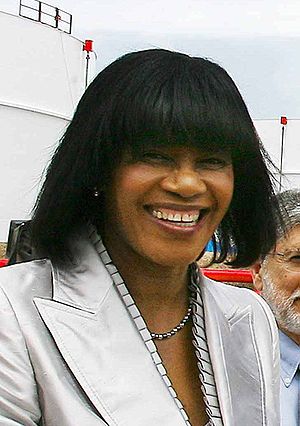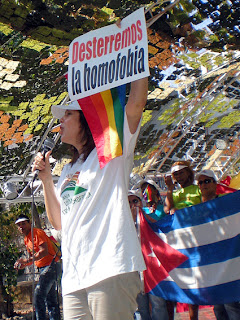| Portia Simpson-Miller image via Wikipedia |
In a moment described as 'historic' by activists, the Jamaican opposition leader has come out for LGBT rights during an election debate.
Jamaicans will go to the polls on December 29 and People's National Party leader Portia Simpson-Miller made the positive comments during an election debate yesterday with Prime Minister Andrew Holness.
Simpson Miller also said that no one should be discriminated against because of their sexual orientation and that if elected Prime Minister she would review the anti-gay buggery law.
She said that she would have no problem with appointing gays to her Cabinet.
Former Prime Minister Bruce Golding famously told the BBC in 2008 that he would never appoint a gay person to his cabinet.
Responding to the same question, Holness articulated the need for Jamaica to achieve minimum standards governing human rights and suggested that such steps were being taken through measures such as the passage of the Bill of Rights. He has previously argued that gay rights are civil rights, not human rights, and therefore not covered by international human rights instruments.
He added that any change to the existing legislation should be made on the basis of due consideration to the views of the people.
“We are an open society and the issues that are difficult and uncomfortable to discuss, as the society progresses, these issues are being discussed. People are entitled to their opinions but as leader of the country I have to respect everybody’s opinion (and) make sure that the institutions of freedom are well in place so that the debate can continue,” said Holness.
The People's National Party (which is in Opposition and trailing in the polls) has selected a non-gender conforming candidate who has been the subject of a barely veiled homophobic campaign by the ruling Jamaica Labour Party (JLP).
Jamaican LGBT rights group J-FLAG has written to the JLP complaining about this tactic.
The PNP has selected another candidate for the traditionally "safe seat" of the tourist resort city of Montego Bay who is rumored to be gay.
Elsewhere in the English speaking Caribbean there has been slow but positive movement on LGBT rights.
At the beginning of the year Caribbean LGBT activists expressed hope for change in 2011.
This followed almost the whole of the Caribbean changed their vote positively - including Jamaica - in a UN vote on killings of LGBT people.
In a January letter to Jamaica's leading newspaper The Gleaner (as well as other regional newspapers), a group of Caribbean LGBT activists, led by the veteran Jamaican LGBT leader Maurice Tomlinson, said that they were proud that a majority of Caribbean nations voted together, in the words of the Rwanda delegation, to "recognise that ... people (of different sexual orientation) continue to be the target of murder in many of our societies, and they are more at risk than many ... other groups".
Yes votes included Antigua and Barbuda, The Bahamas, Barbados, Belize, Dominica, the Dominican Republic and Grenada and St Kitts-Nevis. Only St Lucia amongst Caribbean nations voted no.
They said that:
We, in the Caribbean, have lived largely free of the levels of violence experienced by postcolonial nations like Rwanda . But we continue to harbour a colonial mentality that some groups are more worthy than others; and homophobic killings are a reality in several places in the region. We hope that, without the need for atrocity to teach us this lesson, our governments will mature in their understanding that everyone has an essential right to equality and protection because they are human.In June, the oldest political party in the Bahamas came out in support of LGBT rights.
The vote is a hopeful sign that in 2011 Caribbean governments may get serious about their commitments to these rights at home.
The leader of The Progressive Liberal Party (PLP), who are currently in opposition, Perry Christie, said that his party supports “progressive policies.”
 |
| Verna St Rose-Greaves picture Government of T+T |
In Trinidad and Tobago (T&T), Gender, Youth and Child Development Minister Verna St Rose-Greaves has strongly supported LGBT rights saying in August that 'all citizens of T&T must respect people’s sexual preferences'.
According to veteran Trinidadian gay activist Colin Robinson
"[Verna] is unusual, but not unique. A number of Caribbean politicians have said some very commonsense things on SOGI [sexual orientation and gender identity] issues, notably Barbados's Esther Byer-Suckoo who, when she had the gender portfolio two years ago, proposed domestic violence legislation that would include gay and lesbian people. Her PM has said discrimination based on sexual orientation is wrong."
"In Guyana, the health minister in one of my favourite speeches, at a regional HIV conference in 2009, said, "I will again place myself in harm’s way. But I need not be timid. I am the Minister of Health and I must be driven by public health reality, not by moral judgment. We live in a world where personal freedom must be acknowledged within the realm of reasonableness and within our legislative dicta. In this regards, sex between consenting adults, even if it is adults of the same gender, in private, falls into the category of personal freedom. I believe our laws are in contradiction of this expression of personal freedom.""
"Then there's the St. Kitts PM Denzil Douglas since the Toronto AIDS conference, both Bahamas parties after the Human Rights Council resolution, our [T&T] PM days after election at an event by the main Hindu group. And the Jamaica Senate President during the vote on the homophobic Charter, followed by the Police Commissioner's apology [for a homophobic statement]. And that's just part of the list."
HT: Maurice Tomlinson
































 Join our page
Join our page

